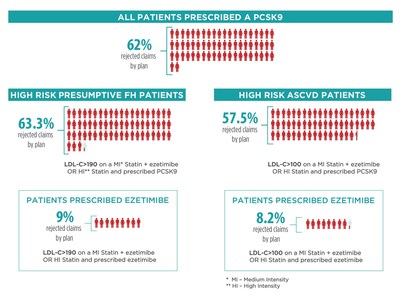PASADENA, Calif., April 26, 2017 /PRNewswire-USNewswire/ -- The Familial Hypercholesterolemia Foundation today published a study in Circulation revealing high rejection rates for PCSK9 inhibitors in the two at-risk patient populations approved for this novel cholesterol-lowering class of therapy.


The FH Foundation's FOCUS (FH Optimal Care in the United States) study found that 63 percent of patients with presumed FH and 58 percent of patients with established atherosclerotic cardiovascular disease (ASCVD) had rejected claims for PCSK9 inhibitor therapy despite sub-optimal low-density lipoprotein cholesterol (LDL-C) levels on statins. Conversely, ezetimibe, a cholesterol-lowering medication also shown to reduce cardiovascular event rates, was rejected 9 percent and 8 percent of the time, respectively, in the two groups.
"Over 1 million people in the United States living with FH have not been accurately diagnosed, although many will show significant signs of coronary heart disease by the time they are 30 or 40 years old. This study shows that individuals with FH are now experiencing an additional barrier to life-saving care: lack of access to needed therapies," said Katherine Wilemon, Founder and CEO of the FH Foundation.
In the FOCUS study published today in Circulation, the FH Foundation examined diagnostic information, pharmacy claims adjudication, and laboratory data on over 1.2 million Americans prescribed either a PCSK9 inhibitor or ezetimibe from their national database that combines claims and lab result data.
The two populations studied were patients with presumed FH based on Make Early Diagnosis, Prevent Early Death (MEDPED) criteria with LDL-C levels greater than 190 mg/dL despite being on moderate or high-intensity statins and patients with ASCVD whose LDL-C was greater than 100 mg/dL despite being on moderate or high-intensity statins.
"This study shows that high-risk patients are being denied effective, FDA-approved treatment to address the unmet need for LDL-C lowering. In light of the FOURIER results for PCSK9 inhibitors showing a significant decrease in the risk for a heart attack, we know that denying this treatment is leaving some patients at undue risk," said Dr. Daniel Rader, Seymour Gray Professor of Molecular Medicine at the University of Pennsylvania and Chief Scientific Advisor to the FH Foundation.
FH is a life-threatening genetic disorder that causes high LDL-cholesterol from birth and significantly increases the risk for early heart disease and heart attacks, independent of diet and lifestyle. An estimated 30 million or 1 in 250 people across all races and ethnicities are impacted by FH. Often undistinguished in clinical care from other causes of high cholesterol, FH remains under-diagnosed and undertreated.
About the FH Foundation
The mission of The FH Foundation, a patient-centered research and advocacy nonprofit organization, is to save lives by contributing to scientific research that leads to greater understanding and improved diagnosis of familial hypercholesterolemia worldwide.
Please visit www.thefhfoundation.org for more information.
SOURCE The FH Foundation
Related Links
WANT YOUR COMPANY'S NEWS FEATURED ON PRNEWSWIRE.COM?
Newsrooms &
Influencers
Digital Media
Outlets
Journalists
Opted In
Share this article